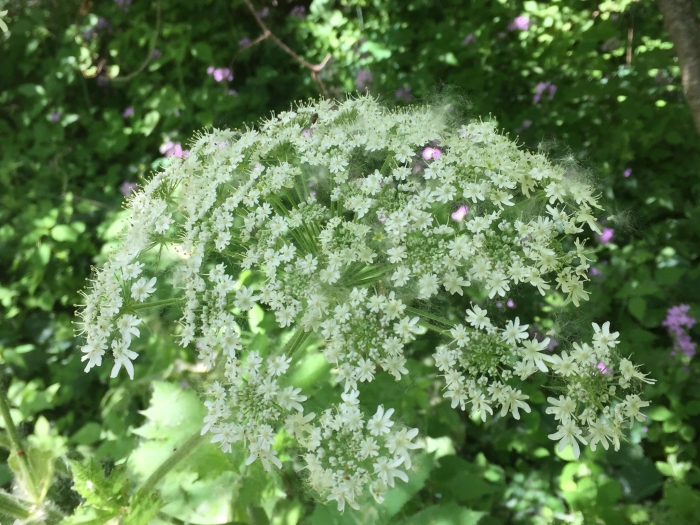Common Hogweed
(Heracleum sphondylium)
Common Hogweed (Heracleum sphondylium)
/
/

© Tom Scavo
CC BY 4.0
Image By:
© Tom Scavo
Recorded By:
Copyright:
CC BY 4.0
Copyright Notice:
Photo by: © Tom Scavo | License Type: CC BY 4.0 | License URL: http://creativecommons.org/licenses/by/4.0/ | Uploader: trscavo | Publisher: iNaturalist |





















Estimated Native Range
Summary
Heracleum sphondylium, commonly known as common hogweed, is a robust, roughly hairy perennial herb native to a variety of habitats including grasslands, riparian zones, and open woodlands across Europe, western Asia, and northern Africa. It typically grows up to 7 feet tall and thrives in moist, nitrogen-rich soils. This plant is characterized by its deeply lobed, pinnate leaves and its large, showy umbels of white or pinkish flowers that bloom from June to September, attracting a variety of pollinators.
Common hogweed is known for its striking presence in the landscape due to its size and the architectural quality of its flower heads. It is sometimes used in naturalistic planting schemes and wildlife gardens. Gardeners value it for its ability to grow in challenging conditions, such as damp soils where other plants might struggle. However, it requires careful handling due to the presence of furanocoumarins in its sap, which can cause phytophotodermatitis, a serious skin reaction to sunlight. It is best grown in full sun to part shade and prefers soils that are consistently moist but well-drained. While it can be a dramatic addition to the right setting, Heracleum sphondylium is potentially invasive outside its native range and can outcompete native vegetation. It is important to manage its spread to prevent it from becoming a problem in non-native ecosystems.CC BY-SA 4.0
Common hogweed is known for its striking presence in the landscape due to its size and the architectural quality of its flower heads. It is sometimes used in naturalistic planting schemes and wildlife gardens. Gardeners value it for its ability to grow in challenging conditions, such as damp soils where other plants might struggle. However, it requires careful handling due to the presence of furanocoumarins in its sap, which can cause phytophotodermatitis, a serious skin reaction to sunlight. It is best grown in full sun to part shade and prefers soils that are consistently moist but well-drained. While it can be a dramatic addition to the right setting, Heracleum sphondylium is potentially invasive outside its native range and can outcompete native vegetation. It is important to manage its spread to prevent it from becoming a problem in non-native ecosystems.CC BY-SA 4.0
Plant Description
- Plant Type: Herb
- Height: 3.2-10 feet
- Width: 1.5-3 feet
- Growth Rate: Moderate
- Flower Color: White
- Flowering Season: Spring, Summer
- Leaf Retention: Deciduous
Growth Requirements
- Sun: Full Sun, Part Shade
- Water: Medium
- Drainage: Medium, Fast
Common Uses
Bee Garden, Bird Garden, Butterfly Garden, Edible*Disclaimer: Easyscape's listed plant edibility is for informational use. Always verify the safety and proper identification of any plant before consumption.
Natural Habitat
Native to grasslands, riparian zones, and open woodlands across Europe, western Asia, and northern Africa
Other Names
Common Names: Hogweed, Eltrot, Meadow-Parsnip, Common Hogweed
Scientific Names: , Heracleum sphondylium, Heracleum aestivum, Heracleum armoricum, Heracleum lecokii var. aurasiacum, Heracleum longifolium, Heracleum morifolium f. angustum, Pastinaca sphondylium var. sibiricum, Sphondylium proteiforme,
GBIF Accepted Name: